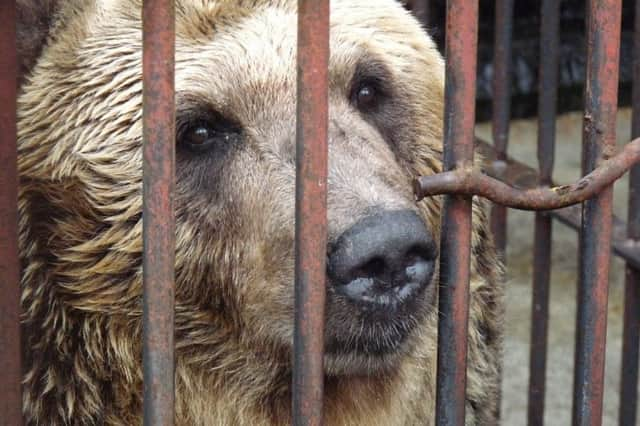Yorkshire Wildlife Park to rehome brown bears from Japan


A detailed plan is being constructed that will create a safe and efficient transfer across the 5,400 miles to the UK. The park, at Branton, near Doncaster, was chosen as their new home because of its global reputation for animal welfare and conservation of at-risk species and for its support for rehoming animals in need.
The four Ussuri brown bears – Riku, Kai, Hanako and Amu will be closely monitored along their route and will travel with an experienced veterinary team.
Advertisement
Hide AdAdvertisement
Hide AdThey are currently being kept at the Ainu Culture Museum on Hokkaido, the northernmost of Japan’s islands. The museum is dedicated to research and preservation of an ancient branch of the nation’s heritage.
John Minion, CEO of the park, said: “The museum does not have the experience or resources to look after the bears now, and wished to find them a new home, so animal welfare organisations around the world teamed up to find a solution.
“We are fortunate we have the space, animal management skills and experience to rehome these bears who will require specialist care, and we are looking forward to welcoming them to Yorkshire. We are grateful to the Ainu Museum for releasing the bears to us here where we will be able to give them a secure and nurturing future.”
Ussuri brown bears weigh up to 550kg and can live up to 35 years.
Advertisement
Hide AdAdvertisement
Hide AdThe bears’ omnivore diet consists of plants, seeds, nuts, fruits, invertebrates, eggs, fish and small or larger mammals.
They are on the IUCN Red List of Threatened Species due to their vulnerability to habitat loss, illegal hunting and capture, and being poached for body parts and skins.
The bears are extinct across parts of Asia and there are thought to be 10,000 left in Japan. The Yorkshire Wildlife Park Foundation has been supporting animal welfare projects in Asia including Japan and, alongside YWP, has been working with other organisations, including agencies in Japan and with UK charity Wild Welfare to secure the bears’ move.
Georgina Groves, Wild Welfare’s projects director, said “The Ainu Museum bears came to our attention a few years ago and we’ve been working closely with the museum, Japanese animal welfare NGOs and zoo experts since, to try and find a more suitable home for them.”
Advertisement
Hide AdAdvertisement
Hide AdBrown bears occupy forest habitats from coastal to mountain regions. Concern had been raised about the conditions within which the bears were living, but the museum could not make the significant enhancements needed to improve their wellbeing. Moving the bears to a facility within Japan that could better accommodate the bears was also explored but currently there is nothing suitable.
The bears will be the first residents in a new Rehabilitation Centre at YWP.
They will initially stay in the 2.5 acre specialist reserve which has been designed for short to mid-term housing of carnivores who have been rescued or rehomed before developing a species specific long term home at YWP.
The park has put out a DIY SOS call to companies or tradespeople to help kit the reserve out for brown bears with rocks, trees, platforms and other environmental features. As the arrival date for the bears is very soon YWP will be announcing a Volunteer’s Day to help create new features in the reserve ready for their arrival and make the bears new reserve extra special.
Advertisement
Hide AdAdvertisement
Hide AdThe park and its foundation supports conservation and welfare projects all around the world from the critically endangered Amur leopard in Russia, the black rhino in East Africa to the lemurs of Madagascar.
YWP, which opened in 2009, allows visitors to get up close to some of the world’s most endangered and beautiful animals, including tigers, African lions, and the country’s only polar bears, in an enchanting walkthrough adventure.